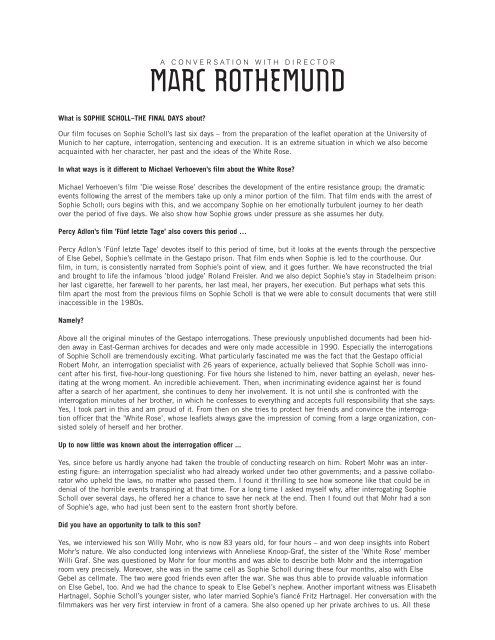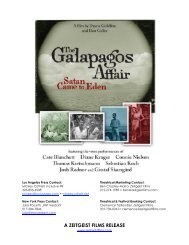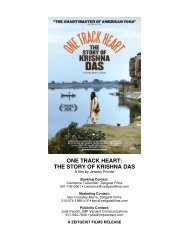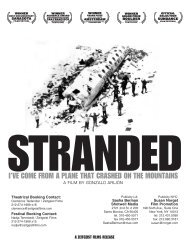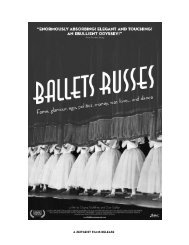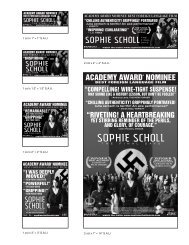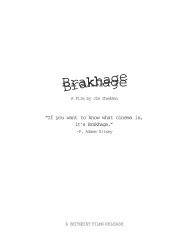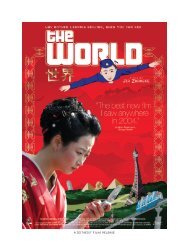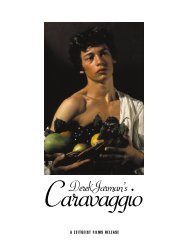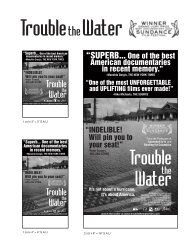Create successful ePaper yourself
Turn your PDF publications into a flip-book with our unique Google optimized e-Paper software.
What is <strong>SOPHIE</strong> <strong>SCHOLL</strong>–THE FINAL DAYS about?<br />
A CONVERSATION WITH DIRECTOR<br />
MARC ROTHEMUND<br />
Our film focuses on Sophie Scholl’s last six days – from the preparation of the leaflet operation at the University of<br />
Munich to her capture, interrogation, sentencing and execution. It is an extreme situation in which we also become<br />
acquainted with her character, her past and the ideas of the White Rose.<br />
In what ways is it different to Michael Verhoeven’s film about the White Rose?<br />
Michael Verhoeven’s film ’Die weisse Rose’ describes the development of the entire resistance group; the dramatic<br />
events following the arrest of the members take up only a minor portion of the film. That film ends with the arrest of<br />
Sophie Scholl; ours begins with this, and we accompany Sophie on her emotionally turbulent journey to her death<br />
over the period of five days. We also show how Sophie grows under pressure as she assumes her duty.<br />
Percy Adlon’s film ’Fünf letzte Tage’ also covers this period …<br />
Percy Adlon’s ’Fünf letzte Tage’ devotes itself to this period of time, but it looks at the events through the perspective<br />
of Else Gebel, Sophie’s cellmate in the Gestapo prison. That film ends when Sophie is led to the courthouse. Our<br />
film, in turn, is consistently narrated from Sophie’s point of view, and it goes further. We have reconstructed the trial<br />
and brought to life the infamous ’blood judge’ Roland Freisler. And we also depict Sophie’s stay in Stadelheim prison:<br />
her last cigarette, her farewell to her parents, her last meal, her prayers, her execution. But perhaps what sets this<br />
film apart the most from the previous films on Sophie Scholl is that we were able to consult documents that were still<br />
inaccessible in the 1980s.<br />
Namely?<br />
Above all the original minutes of the Gestapo interrogations. These previously unpublished documents had been hidden<br />
away in East-German archives for decades and were only made accessible in 1990. Especially the interrogations<br />
of Sophie Scholl are tremendously exciting. What particularly fascinated me was the fact that the Gestapo official<br />
Robert Mohr, an interrogation specialist with 26 years of experience, actually believed that Sophie Scholl was innocent<br />
after his first, five-hour-long questioning. For five hours she listened to him, never batting an eyelash, never hesitating<br />
at the wrong moment. An incredible achievement. Then, when incriminating evidence against her is found<br />
after a search of her apartment, she continues to deny her involvement. It is not until she is confronted with the<br />
interrogation minutes of her brother, in which he confesses to everything and accepts full responsibility that she says:<br />
Yes, I took part in this and am proud of it. From then on she tries to protect her friends and convince the interrogation<br />
officer that the ’White Rose’, whose leaflets always gave the impression of coming from a large organization, consisted<br />
solely of herself and her brother.<br />
Up to now little was known about the interrogation officer ...<br />
Yes, since before us hardly anyone had taken the trouble of conducting research on him. Robert Mohr was an interesting<br />
figure: an interrogation specialist who had already worked under two other governments; and a passive collaborator<br />
who upheld the laws, no matter who passed them. I found it thrilling to see how someone like that could be in<br />
denial of the horrible events transpiring at that time. For a long time I asked myself why, after interrogating Sophie<br />
Scholl over several days, he offered her a chance to save her neck at the end. Then I found out that Mohr had a son<br />
of Sophie’s age, who had just been sent to the eastern front shortly before.<br />
Did you have an opportunity to talk to this son?<br />
Yes, we interviewed his son Willy Mohr, who is now 83 years old, for four hours – and won deep insights into Robert<br />
Mohr’s nature. We also conducted long interviews with Anneliese Knoop-Graf, the sister of the ’White Rose’ member<br />
Willi Graf. She was questioned by Mohr for four months and was able to describe both Mohr and the interrogation<br />
room very precisely. Moreover, she was in the same cell as Sophie Scholl during these four months, also with Else<br />
Gebel as cellmate. The two were good friends even after the war. She was thus able to provide valuable information<br />
on Else Gebel, too. And we had the chance to speak to Else Gebel’s nephew. Another important witness was Elisabeth<br />
Hartnagel, Sophie Scholl’s younger sister, who later married Sophie’s fiancé Fritz Hartnagel. Her conversation with the<br />
filmmakers was her very first interview in front of a camera. She also opened up her private archives to us. All these


